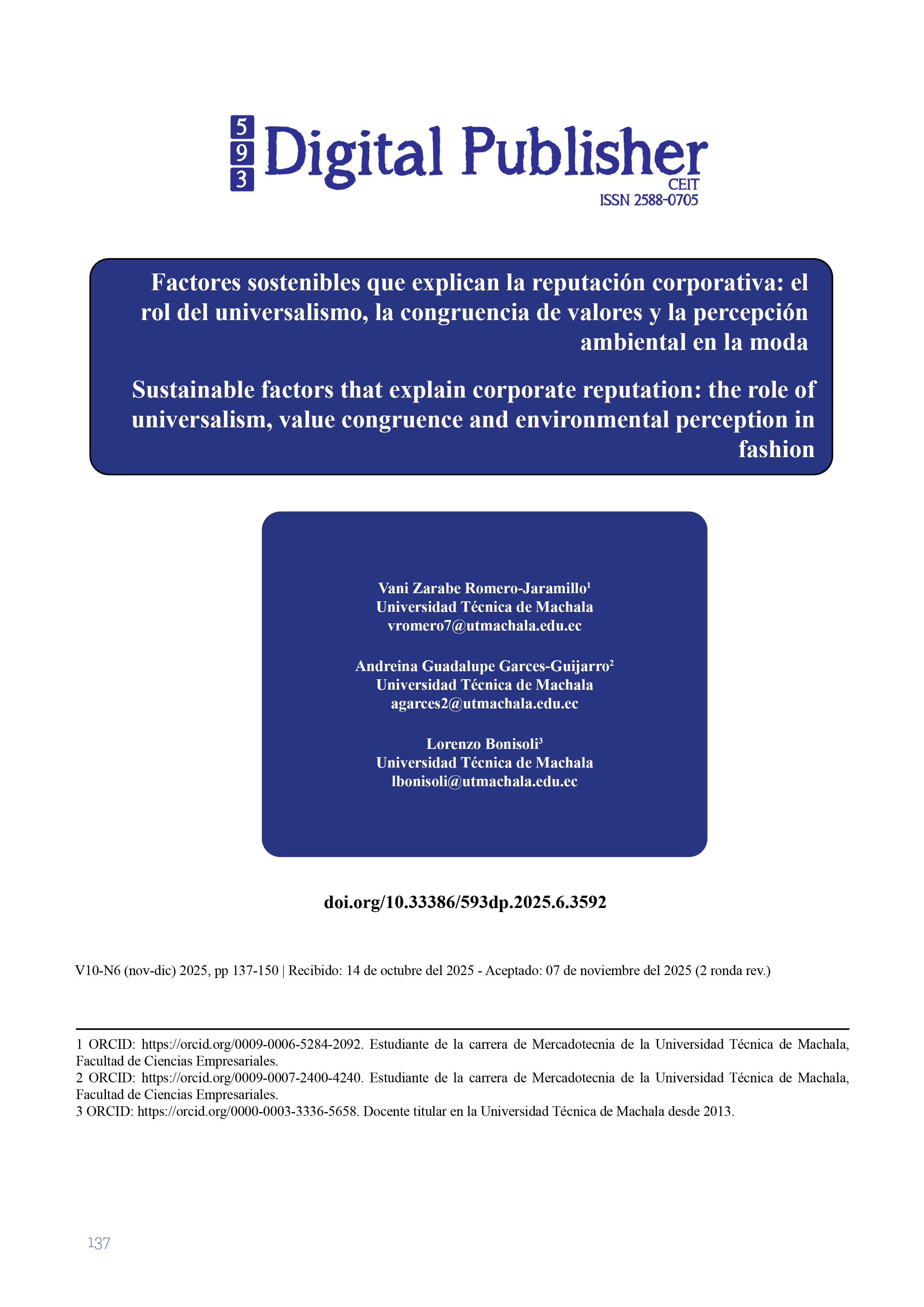Factores sostenibles que explican la reputación corporativa: el rol del universalismo, la congruencia de valores y la percepción ambiental en la moda
Contenido principal del artículo
Resumen
La reputación corporativa en la moda sostenible es un elemento clave porque refleja cómo los consumidores perciben la coherencia entre los valores éticos de las marcas y sus prácticas ambientales. Comprender esta relación permite a las empresas a refuercen la imagen empresarial y diferenciarse en un mercado cada vez más consciente.
El objetivo de esta investigación fue analizar cómo el conocimiento ambiental, la congruencia de valores, la percepción ambiental del producto y el universalismo impactan la reputación corporativa de marcas de moda sostenible. Se aplicó un enfoque cuantitativo y exploratorio a 512 participantes, obteniéndose 260 respuestas válidas, y los resultados se evaluaron mediante la técnica PLS-SEM en SmartPLS.
Los resultados indican que el universalismo es el factor más determinante, ya que conecta los principios éticos del consumidor con las acciones sostenibles de las marcas. Asimismo, la coherencia entre valores y prácticas refuerza la autenticidad percibida, consolidando la reputación corporativa. Estos hallazgos son relevantes para que las empresas diseñen estrategias sostenibles más efectivas y creíbles.
Descargas
Detalles del artículo

Esta obra está bajo una licencia internacional Creative Commons Atribución-NoComercial-CompartirIgual 4.0.
1. Derechos de autor
Las obras que se publican en 593 Digital Publisher CEIT están sujetas a los siguientes términos:
1.1. 593 Digital Publisher CEIT, conserva los derechos patrimoniales (copyright) de las obras publicadas, favorece y permite la reutilización de las mismas bajo la licencia Licencia Creative Commons 4.0 de Reconocimiento-NoComercial-CompartirIgual 4.0, por lo cual se pueden copiar, usar, difundir, transmitir y exponer públicamente, siempre que:
1.1.a. Se cite la autoría y fuente original de su publicación (revista, editorial, URL).
1.1.b. No se usen para fines comerciales u onerosos.
1.1.c. Se mencione la existencia y especificaciones de esta licencia de uso.
Citas
Acar, A., Büyükdağ, N., Türten, B., Diker, E., & Çalışır, G. (2024). The role of brand identity, brand lifestyle congruence, and brand satisfaction on repurchase intention: a multi-group structural equation model. Humanities and Social Sciences Communications, 11(1), 1102. https://doi.org/10.1057/s41599-024-03618-w
Ajzen, I. (1991). The theory of planned behavior. Organizational Behavior and Human Decision Processes, 50(2), 179–211. https://doi.org/10.1016/0749-5978(91)90020-T
Babin, B. J., Darden, W. R., & Griffin, M. (1994). Work and/or fun: Measuring hedonic and utilitarian shopping value. Journal of Consumer Research, 20(4), 644–656. https://doi.org/10.1086/209376
Bahl, S. (2019). The role of environmental consciousness in consumer behavior: Insights from emerging markets. Journal of Environmental Psychology, 62, 130–145. https://doi.org/10.1016/j.jenvp.2019.02.008
Bertola, P., & Colombi, C. (2024). Can fashion be sustainable? Trajectories of change in organizational, products and processes, and socio-cultural contexts. Sustainability: Science Practice and Policy, 20(1). https://doi.org/10.1080/15487733.2024.2312682
Bocken, N. M. P., Short, S. W., Rana, P., & Evans, S. (2014). A literature and practice review to develop sustainable business model archetypes. Journal of Cleaner Production, 65, 42–56. https://doi.org/10.1016/j.jclepro.2013.11.039
Chaudhuri, A., & Holbrook, M. B. (2001). The chain of effects from brand trust and brand affect to brand performance: The role of brand loyalty. Journal of Marketing, 65(2), 81–93. https://doi.org/10.1509/jmkg.65.2.81.18255
Choi, J., He, S., & Deng, S. (2020). Green product purchase intention and its influencing factors in emerging markets. International Journal of Consumer Studies, 44(2), 211–223. https://doi.org/10.1111/ijcs.12544
Diddi, S., & Niehm, L. S. (2017). Exploring the role of values and norms towards consumers’ intentions to patronize retail apparel brands engaged in corporate social responsibility (CSR). Fashion and Textiles, 4(1), 5. https://doi.org/10.1186/s40691-017-0086-0
Escalas, J. E., & Bettman, J. R. (2005). Self-concept congruence and brand choice. Journal of Consumer Research, 32(3), 356-369. https://doi.org/10.1086/497549
Fazio, R. H. (2007). Attitudes as object-evaluation associations of varying strength. Social Cognition, 25(5), 603–637. https://doi.org/10.1521/soco.2007.25.5.603
Gupta, S., & Ogden, D. T. (2009). To buy or not to buy? A social dilemma perspective on green buying. Journal of Consumer Marketing, 26(6), 376–391. https://doi.org/10.1108/07363760910988201
Holbrook, M. B., & Hirschman, E. C. (1982). The experiential aspects of consumption: Consumer fantasies, feelings, and fun. Journal of Consumer Research, 9(2), 132–140. https://doi.org/10.1086/208906
Kumagai, K. (2022). Exploring the role of brand–sustainability–self-congruence on consumers’ evaluation of luxury brands. Asia Pacific Journal of Marketing and Logistics, 35(8), 1951–1969. https://doi.org/10.1108/APJML-05-2022-0380
Kumagai, K. (2024). Assessing the predictive validity of brand-sustainability-self-congruence on consumer behavior and subjective well-being. Asia Pacific Journal of Marketing and Logistics, 36(11), 2907-2930. https://doi.org/10.1108/APJML-11-2023-1131
Lavuri, R., Roubaud, D., & Grebinevych, O. (2023). Sustainable consumption behaviour: Mediating role of pro-environment self-identity, attitude, and moderation role of environmental protection emotion. Journal of Environmental Management, 347(119106), 119106. https://doi.org/10.1016/j.jenvman.2023.119106
Lee, A. Y., & Labroo, A. A. (2004). The effect of conceptual and perceptual fluency on brand evaluation. Journal of Marketing Research, 41(2), 151–165. https://doi.org/10.1509/jmkr.41.2.151.28665
Legere, C., & Kang, J. (2020). The Role of Self-Concept in Shaping Sustainable Consumption: A Model of Slow Fashion. Journal of Business Research, 118, 392-401. https://doi.org/10.1016/j.jbusres.2020.07.043
Manchiraju, S., & Sadachar, A. (2014). Personal Values and Ethical Fashion Consumption. Journal of Fashion Marketing and Management, 18(3), 319–331. https://doi.org/10.1108/JFMM-02-2013-0013
Mandarić, D., Hunjet, A., & Vuković, D. (2022). The impact of fashion brand sustainability on consumer purchasing decisions. Journal of Fashion Marketing and Management, 26(2), 235–250. https://doi.org/10.1108/JFMM-03-2022-0085
Nicolas, M. L. D., Desroziers, A., Caccioli, F., & Aste, T. (2023). ESG Reputation Risk Matters: An Event Study Based on Social Media Data. arXiv. https://doi.org/10.48550/arXiv.2307.11571
Pires, P. B., Morais, C., Delgado, C. J. M., & Santos, J. D. (2024). Sustainable fashion: Conceptualization, purchase determinants, and willingness to pay more. Administrative Sciences, 14(7), 143. https://doi.org/10.3390/admsci14070143
Sirgy, M. J. (1982). Self-concept in consumer behavior: A critical review. Journal of Consumer Research, 9(3), 287–300. https://doi.org/10.1086/208924
Schwartz, S. H. (1992). Universals in the content and structure of values: Theoretical advances and empirical tests in 20 countries. Advances in Experimental Social Psychology, 25, 1–65. https://doi.org/10.1016/S0065-2601(08)60281-6
Thorisdottir, T. S., & Johannsdottir, L. (2020). Corporate Social Responsibility Influencing Sustainability within the Fashion Industry. A Systematic Review. Sustainability, 12(21), 9167. https://doi.org/10.3390/su12219167
Vassalo, A. L., Marques, C. G., Simões, J. T., Fernandes, M. M., & Domingos, S. (2024). Sustainability in the Fashion Industry in Relation to Consumption in a Digital Age. Sustainability, 16(13), 5303. https://doi.org/10.3390/su16135303
White, K., MacDonnell, R., & Ellard, J. H. (2012). Belief in a just world: Consumer intentions and behaviors toward ethical products. Journal of Marketing, 76(1), 103–118. https://doi.org/10.1509/jm.09.0581
Yu, H., Ahn, M., & Han, E. (2023). Key driver of textile and apparel industry management: fashion brand ESG and brand reputation. Frontiers in environmental science, 11. https://doi.org/10.3389/fenvs.2023.1140004
Zhang, Y., & Wang, Y. (2024). Exploring the role of brand–sustainability–self-congruence on consumers’ evaluation of luxury brands. Sustainability, 16(5), 1234. https://doi.org/10.3390/su16051234
Bianchi, C., & González, M. (2021).
Exploring sustainable fashion consumption among eco-conscious women in Chile. The International Review of Retail, Distribution and Consumer Research, 31(4), 375–392.
https://doi.org/10.1080/09593969.2021.1903529
Rodríguez Aboytes, J. G., & Barth, M. (2022).
Learning processes in the early development of sustainable niches: The case of sustainable fashion entrepreneurs in Mexico. Sustainability, 14(3), 1451.




